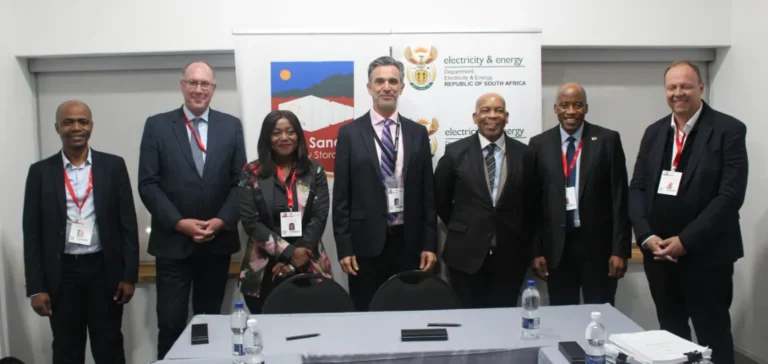Globeleq, an independent energy infrastructure specialist, and its partner African Rainbow Energy have signed commercial agreements for the battery energy storage system (BESS) project named Red Sands BESS, located in South Africa’s Northern Cape province. With a capacity of 153 megawatts (MW) and energy storage capability of 612 megawatt-hours (MWh), the project becomes Africa’s largest standalone energy storage installation.
Enhancing grid stability
The Red Sands BESS project spans approximately five hectares and includes significant upgrades to existing infrastructure operated by national utility Eskom and the National Transmission Company South Africa (NTCSA). This installation primarily aims to ease congestion in Northern Cape’s electricity transmission lines by storing energy during off-peak periods and feeding it back into the grid at times of peak demand.
According to Globeleq, the project will also provide ancillary services and direct grid management support to NTCSA. Awarded to Globeleq in 2024 as part of the government-backed independent energy storage solutions programme, the project is expected to contribute directly to stabilising the national grid and improving management of renewable energy intermittency.
Expanding energy portfolio
Red Sands BESS is Globeleq’s second large-scale energy storage initiative following its combined solar and battery storage plant in Cuamba, Mozambique. Globeleq currently operates thirteen other solar, wind, and hybrid photovoltaic-plus-storage installations distributed across South Africa, Mozambique, Kenya, and Egypt, as well as a geothermal plant under construction in Kenya.
Jonathan Hoffman, CEO of Globeleq, stated that “this major commercial milestone for the Red Sands BESS marks a significant advancement for large-scale clean energy infrastructure in Africa, addressing the continent’s increasing demand for stable and reliable electricity.”
International partnership and local investment
For Brian Dames, CEO of African Rainbow Energy, “this investment aligns with our commitment to utilise modern energy technologies to provide affordable electricity and support economic development in South Africa”. This initiative is part of the South African investment programme totalling three billion rand (ZAR3bn, approximately $159mn).
The project also benefits from international support, notably from the United Kingdom and Norway. British High Commissioner Antony Phillipson cited “a tangible example of partnership supporting energy security”, while Norwegian Ambassador to South Africa, Gjermund Sæther, emphasised the importance of public-private collaborations to achieve energy security and environmental sustainability goals.





















